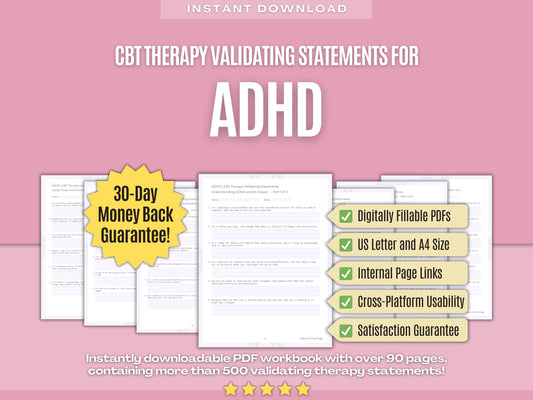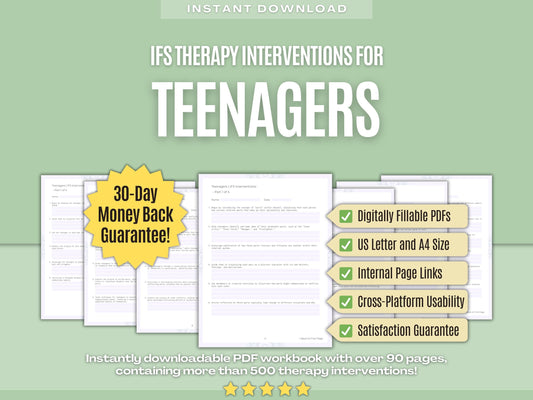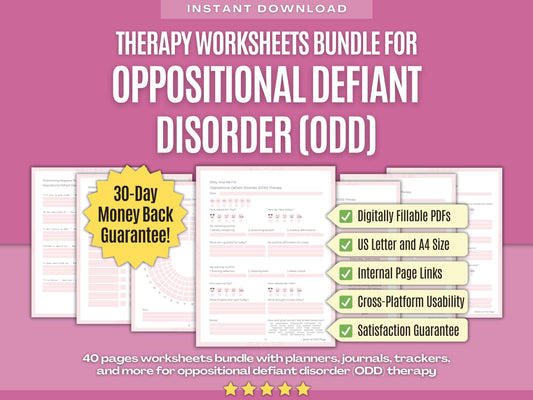Elevate Your Therapy and Guide Your Clients to Inner Healing with Our Oppositional Defiant Disorder (ODD) Therapy Session Questions! ✨
1. Starting ODD Therapy
- How have things been since our last session, and have there been any notable changes or developments in your child’s behavior?
- How has your child responded to any new routines or interventions you’ve tried to establish at home or in other environments?
- What strengths or progress have you noticed in your child since beginning therapy, and how have you been nurturing or reinforcing those positive aspects?
- How has your child been coping with any changes or expectations that have been set since starting therapy?
- Have you noticed any patterns or trends in your child’s behavior that may indicate progress or areas that still need attention?
- Are there any concerns or questions you have about the effectiveness of the therapy process thus far?
- How has your understanding of your child’s oppositional behavior evolved since beginning therapy, and what insights have you gained about potential triggers or underlying issues?
- How has your relationship with your child evolved throughout the therapy process, and what changes have you noticed in your interactions?
- How are you prioritizing self-care and managing your own stress levels amidst the challenges of parenting a child with oppositional defiant disorder?
- Are there any specific goals or milestones you’d like to work towards achieving in the upcoming sessions?
- Can you provide examples of positive reinforcement techniques that have resonated with your child and helped to motivate desired behaviors?
2. Educating on ODD
- Can you describe your current understanding of oppositional defiant disorder (ODD) and how it manifests in your child’s behavior?
- How has your child’s diagnosis of ODD been explained to you previously, and do you feel you have a comprehensive understanding of the disorder?
- Can you identify any similarities or differences between your child’s behavior and the diagnostic criteria for ODD outlined in the DSM-5?
- Have you noticed any patterns or triggers that tend to exacerbate your child’s oppositional behavior, and how do you typically respond to these situations?
- Can you discuss any challenges or barriers you’ve encountered in implementing behavior management techniques or interventions at home?
- Are there any cultural or familial factors that influence your beliefs or practices regarding discipline and parenting strategies?
- Can you describe any experiences you’ve had seeking support or information about ODD from other sources, such as books, websites, or support groups?
- Are there any specific challenges or conflicts you’ve encountered in advocating for your child’s needs in educational or social settings?
- How do you balance setting appropriate boundaries and expectations with providing your child with the support and understanding they need to manage their oppositional behavior?
- How do you incorporate opportunities for praise and positive reinforcement into your interactions with your child, and do you feel this approach is effective?
- Are there any concerns or fears you have about the long-term implications of ODD on your child’s development and well-being?
3. Mindfulness Strategies for ODD
- Can you describe your current understanding of mindfulness and how it might be beneficial in managing your child’s oppositional defiant disorder (ODD)?
- How do you typically respond to stressful or challenging situations involving your child’s oppositional behavior, and do you notice any patterns in your reactions?
- Can you discuss any barriers or challenges you anticipate encountering in incorporating mindfulness practices into your daily routine?
- Can you identify any specific triggers or stressors in your environment that tend to escalate your child’s oppositional behavior, and how might mindfulness help you respond differently in those moments?
- Are there any cultural or familial influences that shape your beliefs or attitudes towards mindfulness practices, and how might these factors impact your willingness to engage in these techniques?
- Can you describe any experiences you’ve had with mindfulness-based interventions or therapies in the past, and how they’ve influenced your perception of these practices?
- What specific goals or outcomes are you hoping to achieve through the integration of mindfulness strategies into your child’s therapy plan?
- How do you currently approach discipline and conflict resolution with your child, and how might mindfulness principles inform or enhance these interactions?
- What role do you see mindfulness playing in improving communication and strengthening your relationship with your child?
- Can you discuss any experiences you’ve had with practicing mindfulness as a family, and how these activities have been received by your child?
- Are there any specific mindfulness exercises or techniques that resonate with you or your child, and how might you incorporate these into your daily routine?
4. Dialectical Behavior Therapy (DBT) for Emotional Control
- How familiar are you with dialectical behavior therapy (DBT) and its application in managing emotional dysregulation in children with oppositional defiant disorder (ODD)?
- How do you currently perceive your child’s ability to regulate their emotions, and what challenges or difficulties have you observed in this area?
- What strategies have you already tried to help your child manage their emotions, and how effective have these interventions been in reducing emotional dysregulation?
- How do you prioritize validation and empathy in your interactions with your child when they’re experiencing intense emotions, and what techniques have you found helpful in de-escalating emotional crises?
- How do you currently model healthy emotion regulation for your child, and what opportunities exist to further reinforce these skills through your own behavior?
- What role do you see mindfulness playing in helping your child develop greater awareness of their emotions and the ability to respond to them in a more balanced way?
- Can you provide examples of situations where your child has demonstrated adaptive emotion regulation skills or effective problem-solving strategies, and what factors contributed to these successes?
- Can you identify any external stressors or environmental factors that may be contributing to your child’s emotional dysregulation, and how can these factors be addressed?
- Can you discuss any experiences you’ve had with using validation and validation strategies to support your child during moments of emotional distress, and how effective have these strategies been?
- Can you identify any cognitive distortions or irrational beliefs that may be contributing to your child’s emotional reactions, and how can DBT help challenge and reframe these beliefs?
- Can you discuss any concerns or fears you have about the potential effectiveness of DBT in managing your child’s emotional dysregulation, and how might you address these apprehensions?
5. Interpersonal Therapy (IPT) for Social Skills
- How familiar are you with interpersonal therapy (IPT) and its potential application in helping your child develop social skills and improve their relationships in the context of oppositional defiant disorder (ODD) therapy?
- How do you currently perceive your child’s social skills and ability to navigate interpersonal relationships, and what challenges or difficulties have you observed in this area?
- What strategies have you already tried to help your child improve their social skills, and how effective have these interventions been in promoting positive changes?
- How do you prioritize validation and empathy in your interactions with your child when discussing their social experiences or difficulties, and what techniques have you found helpful in promoting understanding?
- How do you currently model healthy interpersonal skills and communication for your child, and what opportunities exist to further reinforce these skills through your own behavior?
- What role do you see role-playing and rehearsal playing in helping your child practice and refine their social skills, and what techniques might facilitate this process?
- Can you provide examples of situations where your child has demonstrated improvement in their social skills or interactions, and what factors contributed to these successes?
- Can you identify any external stressors or environmental factors that may be impacting your child’s social skills development, and how can these factors be addressed?
- Can you discuss any experiences you’ve had with using role-playing or social skill-building activities to help your child develop their interpersonal skills, and how effective have these strategies been?
- Can you identify any cognitive distortions or negative beliefs that may be impacting your child’s social interactions, and how can IPT help challenge and modify these beliefs?
- Can you discuss any concerns or fears you have about the potential effectiveness of IPT in helping your child develop social skills, and how might you address these apprehensions?
6. Emotion-Focused Therapy (EFT) for Emotional Awareness
- How familiar are you with emotion-focused therapy (EFT) and its potential application in helping your child develop emotional awareness and regulation skills in the context of oppositional defiant disorder (ODD) therapy?
- How do you currently perceive your child’s emotional awareness and ability to identify and express their feelings, and what challenges or difficulties have you observed in this area?
- What strategies have you already tried to help your child develop emotional awareness and regulation skills, and how effective have these interventions been in promoting emotional well-being?
- How do you prioritize validation and empathy in your interactions with your child when discussing their emotions, and what techniques have you found helpful in promoting understanding?
- What role do you see self-reflection and self-awareness playing in helping your child develop greater emotional insight, and what techniques might facilitate this process?
- Can you provide examples of situations where your child has demonstrated progress in recognizing and managing their emotions, and what factors contributed to these successes?
- Can you identify any external stressors or environmental factors that may be impacting your child’s emotional well-being, and how can these factors be addressed?
- Can you discuss any experiences you’ve had with using emotion-focused techniques such as emotion labeling or exploring the function of emotions to help your child develop emotional awareness, and how effective have these strategies been?
- Can you identify any cognitive distortions or negative beliefs that may be impacting your child’s emotional awareness, and how can EFT help challenge and modify these beliefs?
- Can you discuss any concerns or fears you have about the potential effectiveness of EFT in helping your child develop emotional awareness and regulation skills, and how might you address these apprehensions?
- Can you identify any specific EFT techniques or exercises that resonate with you or your child, and how do you plan to integrate these into your daily routine?
7. Psychodynamic Approaches to Underlying Issues
- Can you reflect on any recurring themes or patterns in your relationships or behavior that you've noticed?
- Have you ever experienced feelings of anger or frustration that seem disproportionate to the situation at hand?
- Have you noticed any similarities between your reactions to authority figures now and those from your past?
- Have you ever explored the idea of defense mechanisms and how they might manifest in your daily life?
- Can you identify any unresolved conflicts or emotional wounds from your past that you believe may be impacting your present behavior?
- Have you ever experienced moments of self-sabotage or resistance to positive change, and if so, what do you think might be underlying those behaviors?
- Have you noticed any discrepancies between the image you present to others and how you truly feel inside?
- What role do you believe your family dynamics played in shaping your current emotional landscape?
- Can you reflect on any significant losses or traumas in your life and how they may have affected you?
- Can you recall any early experiences of attachment or bonding with caregivers, and do you believe they have influenced your ability to form healthy relationships?
- How do you perceive your ability to trust others, and do you find it challenging to open up in therapy?
8. Music Therapy for Emotional Regulation
- How does music influence your mood or emotional state on a day-to-day basis?
- In what ways do you currently use music as a tool for coping with stress or difficult emotions?
- How do you think music therapy might help you regulate your emotions more effectively?
- What role does music play in your daily routine, and how do you think this impacts your emotional well-being?
- Are there any musical instruments you enjoy playing or would like to learn to play as part of your therapy journey?
- Do you think there are certain types of music or sounds that trigger your oppositional behaviors more than others?
- Have you ever experienced a strong emotional response to a piece of music that you couldn't fully explain?
- Are there any lyrics or songs that resonate with your experiences of defiance or rebellion?
- How do you envision incorporating music into your daily self-care routine outside of therapy sessions?
- How does listening to music differ from actively engaging with it in a therapeutic context?
- What do you hope to gain from exploring music therapy as part of your treatment plan for ODD?
9. Wrapping Up Therapy Sessions
- Looking back on our therapy journey together, what are some key insights or realizations you've gained about yourself?
- Are there any specific skills or strategies you've learned in therapy that you plan to continue using in your daily life?
- Reflecting on our sessions, are there any particular moments or exercises that stand out to you as particularly helpful or impactful?
- Are there any unresolved issues or concerns you feel we haven't had a chance to address fully in our sessions?
- How has your understanding of your oppositional behaviors evolved throughout the course of therapy?
- How do you plan to continue working on building healthier communication and conflict resolution skills outside of therapy?
- Looking ahead, what goals do you have for yourself in terms of managing your emotions and behaviors?
- Are there any resources or support networks you plan to utilize to help you maintain your progress after therapy?
- How have you developed a greater sense of self-awareness throughout the therapy process?
- How do you plan to hold yourself accountable for continuing to work on your personal growth and development?
- How do you plan to integrate the insights and skills you've gained in therapy into your daily routines and interactions?
10. Concluding the Therapeutic Journey
- How do you feel about the progress you've made throughout our therapy journey for ODD?
- Are there any goals or objectives we set at the beginning of therapy that you feel you've successfully achieved?
- Are there any aspects of our therapeutic work together that you found particularly challenging or rewarding?
- Have you noticed any shifts in your perspective or understanding of your emotions and behaviors since beginning therapy?
- Are there any unresolved issues or concerns you feel we haven't had the opportunity to address fully in therapy?
- How do you plan to approach conflicts or challenges in your life differently now that you've completed therapy?
- Have you noticed any changes in your relationships with others as a result of the work we've done in therapy?
- Are there any specific tools or techniques you've learned in therapy that you plan to incorporate into your daily life?
- How do you plan to address any setbacks or relapses that may occur in your journey toward better emotional regulation and behavior management?
- How do you plan to prioritize self-care and emotional well-being in your life post-therapy?
- How do you envision your life looking different now that you've completed this phase of your therapeutic journey?
We hope that our therapy session questions for Oppositional Defiant Disorder (ODD) therapy will help you to elevate your therapy practice and guide your clients to inner healing! Do you need more therapy session questions for Oppositional Defiant Disorder (ODD) therapy? Find them all in our Digital Workbook! Or do you have any questions or suggestions for us? Please feel free to contact us at any time!


















